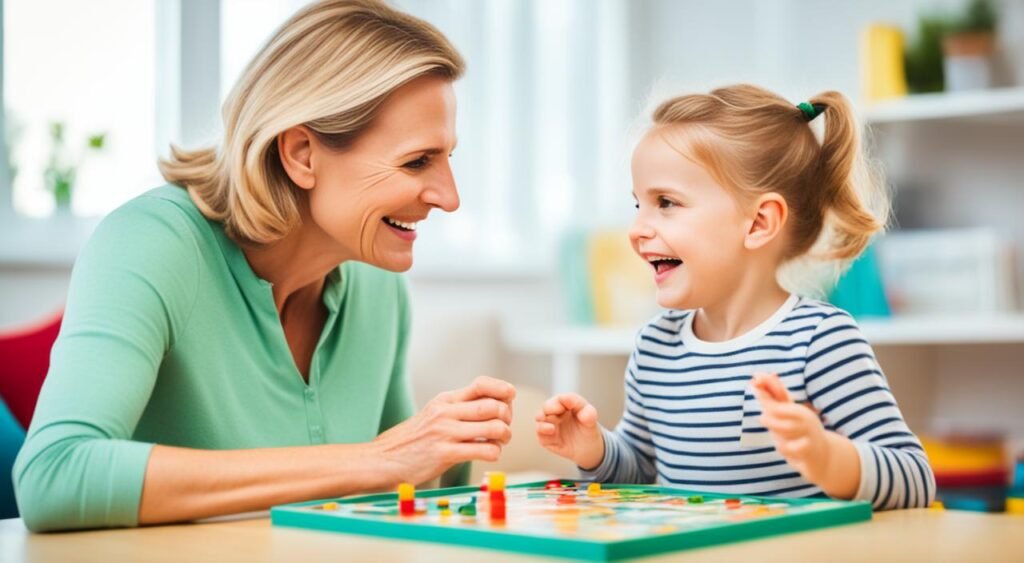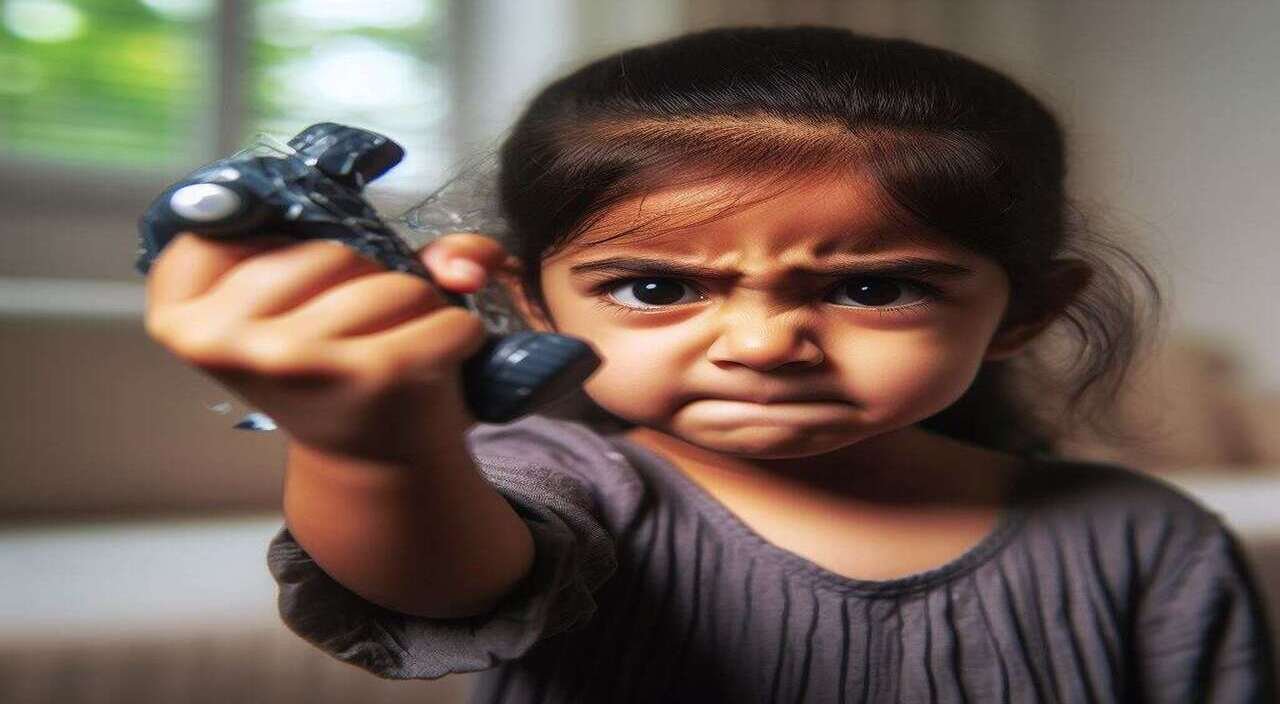Understanding why your child hits can be tough for parents. It’s good to know why they do it. Then, you can teach them new ways to act. Use methods like positive discipline and a supportive home to help your child learn better ways to communicate and solve problems.
This article will help you figure out why kids hit and how you can stop it. It shares tips for all parents, new and experienced. You’ll learn important info and steps to take to end your child’s hitting behavior.
Key Takeaways:
- Understanding the reasons behind hitting behavior is crucial for effective discipline strategies.
- Supervise and handle toddlers kindly and firmly, providing alternative ways to express emotions.
- Consistently set clear boundaries, enforce consequences, and model appropriate behavior.
- Recognize triggers and intervene early to redirect behavior.
- Create a positive and supportive environment that encourages open communication and problem-solving.
Understanding Why Toddlers Hit
Toddlers may hit for many reasons. It’s crucial for parents to know that hitting is a phase many toddlers go through. It’s not a sign that parents are doing something wrong. Knowing how to manage child aggression can really help. Let’s take a look at why toddlers hit and how positive parenting can stop child violence.
Hitting to Test Limits and Lack of Self-Control
Toddlers love to explore and find their limits. Hitting can help them learn about actions and consequences. They sometimes hit because they can’t control their impulses. Parents should set clear limits to stop child violence and help toddlers learn self-control.
Difficulty Understanding That Hitting Is Wrong
Understanding that hitting is wrong takes time to develop. Toddlers are still learning this. Parenting in a positive way can show toddlers that hitting is not okay. This is through talking to them in ways they understand and explaining things clearly.
Processing Emotions and Seeking Attention
Toddlers are just learning how to handle their feelings. Hitting might be their way of saying they’re upset or want attention. Helping them find better ways to deal with their emotions can stop aggressive behavior. This is by teaching them how to talk about their feelings and offering other ways to seek attention.
It’s so important to deal with child aggression kindly and with empathy. Toddlers are still growing, so they’re learning how to act. Using positive parenting can really cut down on violent behavior. It also helps their emotional growth.
Parents should lead by example and provide love and clear rules. Understanding why toddlers hit helps parents stop child violence. By using good parenting methods, kids can learn better ways to handle their emotions and talk about what they need.
Strategies for Dealing with Toddler Hitting
Dealing with toddlers who hit can be hard. But there are ways parents can help. They can set clear rules, give fair consequences, and teach better behaviors. This can steer their child toward acting more positively.
Setting Boundaries with Children
Setting clear rules is vital when it comes to toddler hitting. Kids must know that hitting is wrong. They must also know it leads to consequences. This helps them learn what’s right.
Tip: Use simple words to explain this to your child. For example, say, “Hitting is not okay because it hurts others.”
Consequences for Hitting
Consequences are crucial for teaching kids right from wrong. When a child hits, they must face a consequence right then. This could be a time-out or loss of a privilege. It must fit the hitting action.
Quote: “Consistency with consequences is crucial. They must be fair and match the action taken.” – Dr. Sarah Thompson, Child Psychologist
By staying calm and strict when applying consequences, parents show their child the harm in their actions. They also teach the importance of respecting others.
Behavior Modification Techniques
There are methods that focus on improving a child’s behavior. This includes rewarding positive actions and teaching healthy ways to share feelings. For hitting, here are some strategies:
- Let your child know when they do good. This could be helping them use gentle hands or find better ways to show their feelings. This encourages more of these positive actions.
- Help your child handle their feelings. Create a safe space for them to talk and share. Teach them ways to deal with anger or disappointment.
- When your child is about to hit, change their focus. Guide them to a new activity or way of expressing their feelings.
By using these strategies together and keeping at it, parents can help their child get past hitting. They can learn to treat others with respect and in a positive way.
Preventing Future Hitting Incidents

To stop hitting before it happens, parents need to watch their kids and find what makes them upset. When they see these triggers, they can step in to stop any hitting. It’s important to teach kids other ways to handle big feelings. Breathing deeply or doing calming things can help a lot. This is how children learn to control themselves better and act in good ways.
Making a loving home is key to keeping children from being violent. Listening to what your child feels and talking things out can stop hitting. Rules and boundaries help kids know the right things to do. This makes it less likely they will be violent. Plus, setting the right example is powerful. Kids watch and copy the way you deal with problems and feelings.
To avoid child violence, parents should be active and caring. They should look for what sets their child off, teach better ways to cope, and build a loving place at home. Doing these things will help kids act well and not hit others.
Conclusion
Witnessing a child’s hitting behavior can worry and frustrate parents. Yet, handling it properly with good discipline and parenting techniques makes a big difference.
First, parents need to understand why their child hits. This insight helps offer the right guidance. It supports the child in dealing with their feelings and how they relate to others.
It’s critical to set clear rules against hitting. By doing so and consistently following through, parents show hitting isn’t okay. Also, they impose fair consequences for it. Keeping cool and not getting angry matters a lot in such moments.
But discipline isn’t everything. Providing emotional support and teaching better ways to act are vital too. This makes for a friendlier home where the child learns to handle emotions and interactions well.
FAQ
Why do toddlers hit?
Toddlers hit because they are still learning how to act. They test limits and have trouble controlling themselves. They often don’t know that hitting is bad. Emotions can also be hard for them to understand.
How can I stop my child from hitting?
To stop a child from hitting, clear rules are key. Make sure these rules are always followed. Explain that hitting isn’t right. Show the bad things that happen when they hit, like losing playtime. Teaching better ways to share feelings and wants is important as well.
How can I prevent future hitting incidents?
Watch your child to find out what makes them hit. Stop the hitting before it happens. Teach them how to handle feelings without hitting, like taking deep breaths. A friendly place at home where they can talk about how they feel helps a lot too. Communication is very important.
How do positive parenting techniques help with toddler hitting behavior?
Positive parenting means setting rules but also being kind and helpful. It shows children better ways to deal with their feelings and play nicely with others. Being a good role model and giving steady advice help make a happy and learning place for children.





